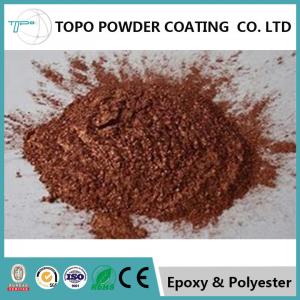
Add to Cart
RAL1005 honey yellow electrostatic thermoset powder coating with high mechanical property
Powder coatings are applied to metal substrates to form highly durable and attractive finishes. They are manufactured and applied without the use of organic solvents; thus, they are highly desirable from an ecological standpoint. Most of the current interest in industrial powder coating technology is in formulations based on thermosetting resin binders, predominantly epoxies and polyesters (saturated types with carboxyl or hydroxyl functional groups). Epoxies are preferred for their overall physical properties, while polyesters exhibit better outdoor weathering properties. This report focuses on powder coatings based on thermosetting resins and discusses only the electrostatic spray method of application. Most of the interest in powder coatings and their best prospects for growth involve these technologies. The major thermosetting powder coatings are based on four chemistries: epoxy, polyester, urethane and acrylic.
Thermoset Pros
Thermoset Cons
Product Details | |
Type | Epoxy Polyester Powder Coating |
Gloss Level | Gloss 88% |
Surface Finish | Texture |
Powder Property | |
Appearance | Fine powder |
Particle Size | Average 32-40μm |
Specific Gravity | 1.3-1.5g/cm3 |
Coverage | 7-8 square meter per Kg at 80μm film thickness |
Application Recommendation | |
Applicatoin | Corona |
Application Voltage | 60-90 KV |
Gun to Component Distance | 15-30 CM |
Film Thickness | 80-90μm |
Curing Temperature | 190℃(Object temperature) for 15 minutes |
Powder Coated Film Mechanical Properties | |
Adhesion | Cross-cut (2mm), no loss of adhesion |
Impact Resistance | Direct & Indirect 50kg/cm |
Pencil Hardness | 2H |
Flexibility | 7mm Mandrel |
Bending Test | 3mm |
Powder Coated Film Chemical Resistance | |
Salt Spray Test | 5% NaCl Solution for 1000 hours - No change |
Acid Resistance | 5% HCL for 48 hours dip test - No change |
Alkali Resistance | 5% NaOH for 48 hours dip test - No change |

